“I love America more than any other country in the world and, exactly for this reason, I insist on the right to criticize her perpetually.”
– James Baldwin
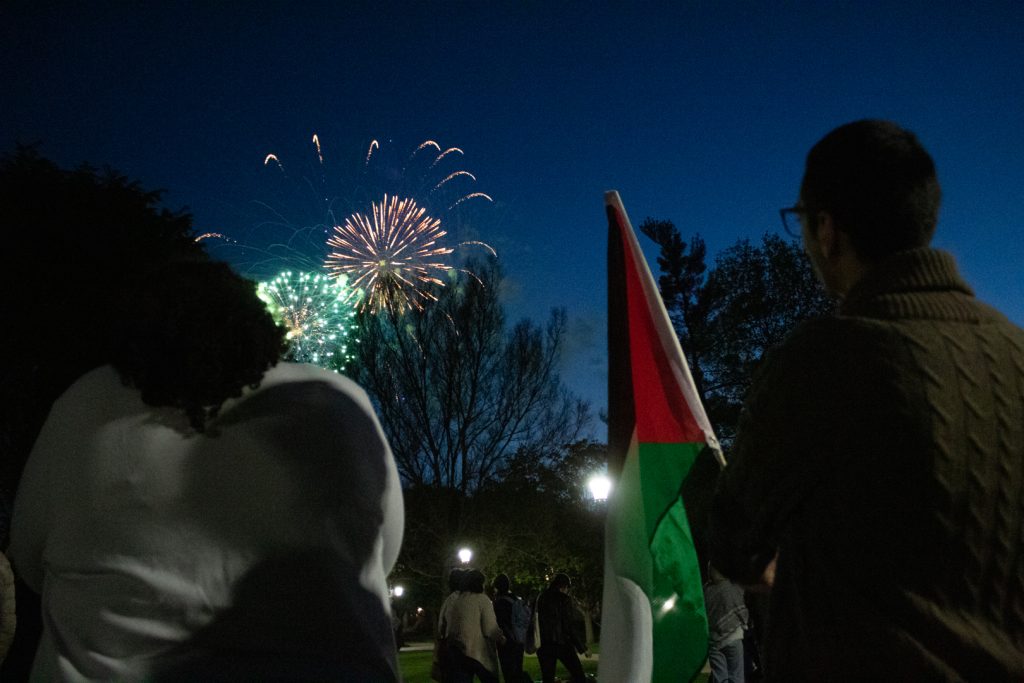
This Thursday, April 25th, the Notre Dame administration hosted a celebratory evening on South Quad intended to commemorate Father Jenkins and his years of service. Food trucks were parked and pizza was piled onto tables. Students shook hands with Jenkins himself as he walked around the quad. Complimentary mugs were handed out. A DJ booth was set up, and dance circles were formed. At sundown, fireworks were set off, emblazing the sky in a brilliant gold and blue. But this air of levity and celebration was countered by a different atmosphere just a few feet away.
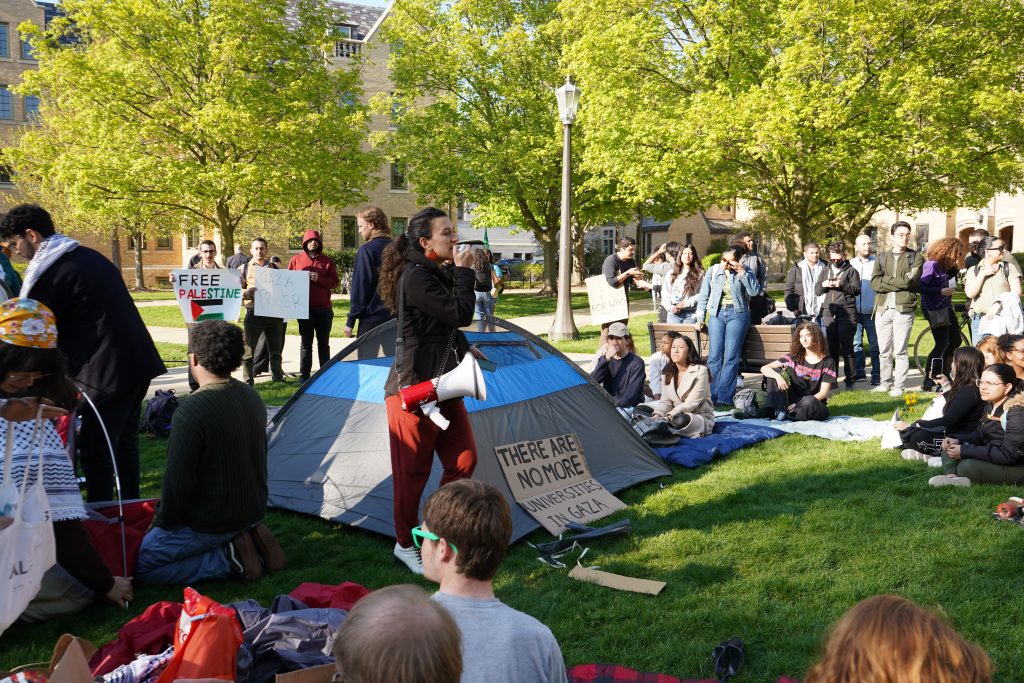
Beneath the explosions of light and color, and behind the booming bass of generic EDM songs, a small yet powerful chant of resistance could be heard: “Free Free Palestine!” Beginning at 5pm and continuing to 11pm, over 100 students and faculty gathered on the side of these festivities. This student-led sit-in was in open defiance of Notre Dame’s draconian protest policies that have severely restricted school demonstrations for over fifty years. Standing in solidarity with the people of Gaza, with Columbia and other American universities, and against the Israeli genocidal campaign and US complicity in these crimes against humanity, the defiant dissenters of Notre Dame sent a bold message to Fr. Jenkins and the administration: We will put our bodies on the line to fight for justice in the face of apathy and complicity.

After a prayer and reflection circle on God Quad, the protest was moved to the front area of Morrissey Hall. The atmosphere was indescribable. Despite the uncertainty of how the administration would react (would there be suspensions? Arrests? How could we best prepare for possible violence?), there was also laughter and excitement in the community we had created. In an act of coming together, and without being granted permission from authorities, a joyful and joint solidarity was borne. Everyone seemed to know what to do, laying out blankets, passing out water, setting up the tents. But what we didn’t anticipate was the aggressive reaction against the tents specifically. Within a half hour of the two tents being set up, around ten cops came and took them down. Did a single tent really require eight cops to confiscate altogether? “Free Free Palestine!” we shouted as each pole supporting the tent’s structure was torn down, as they attempted to forcibly remove our students sitting in the tents.
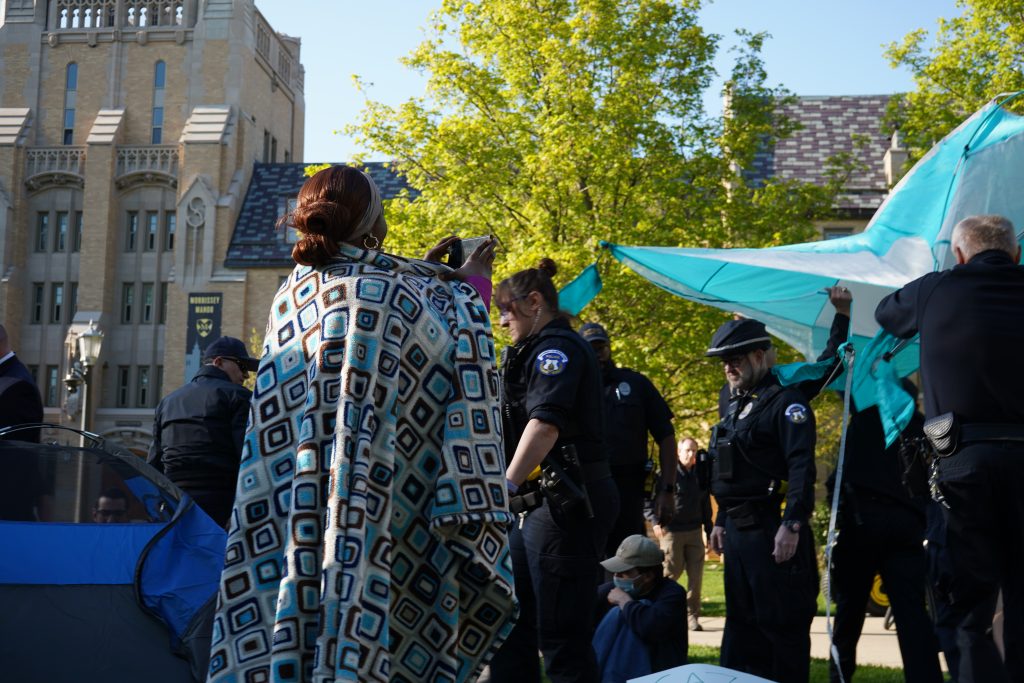
Later in the night, a second attempt was made to put up a tent. With knowledge from our previous attempt, we tightly locked arms, creating concentric rings around the encampment. The NDPD gathered around us, but we held strong. Suddenly they made their way to push through, wresting our arms apart, shoving our bodies away, yanking the tent poles and fabric from out of the center. A small scuffle, some shouting, and the tent was pulled through. The police retreated, and we resumed our chanting.
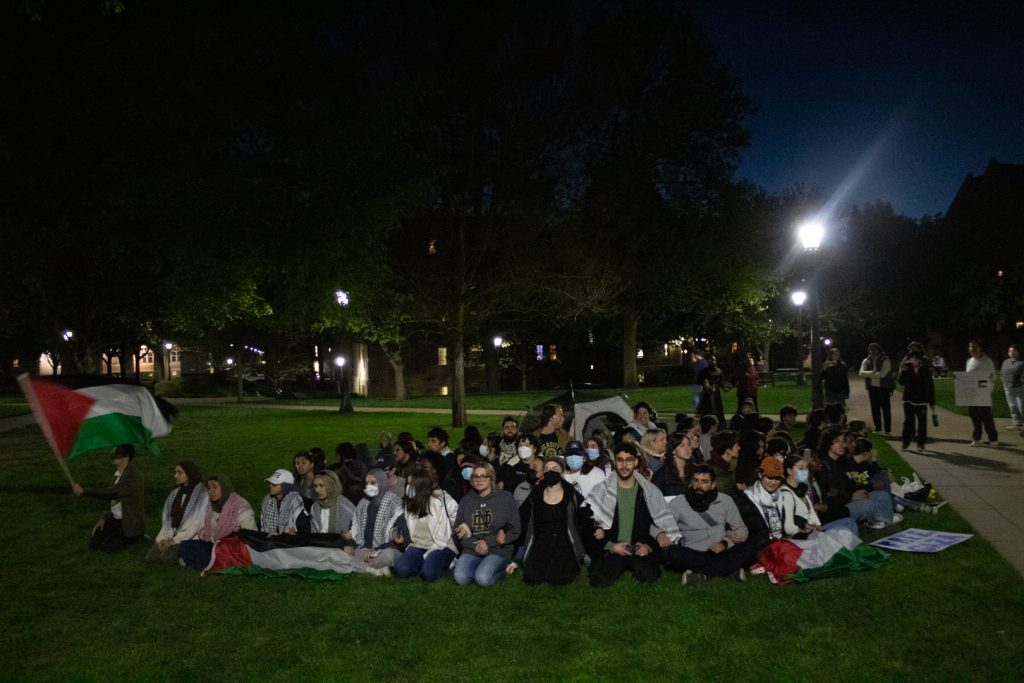
One of the main organizers stood up and exclaimed: “It is what the tents represent that is so infuriating on campuses right now. We are doing nothing wrong. We are standing for justice. We are standing up for people who do not have voices right now, who are being silenced and they are being silenced by being murdered. It is not about the tent but what the tent represents. If the tent was for anything else, this would not have happened…for a casual picnic, it would not have happened. But because of what the tent represents, the millions of Palestinians who are living in tents, that is what is infuriating. And that is what this university does not want to confront right now.” The University does not have any policies prohibiting tents under 200 square feet from being set up on quad areas. This calls us to question the sheer lack of justification behind the cops’ actions and their inability to follow even their own rules.
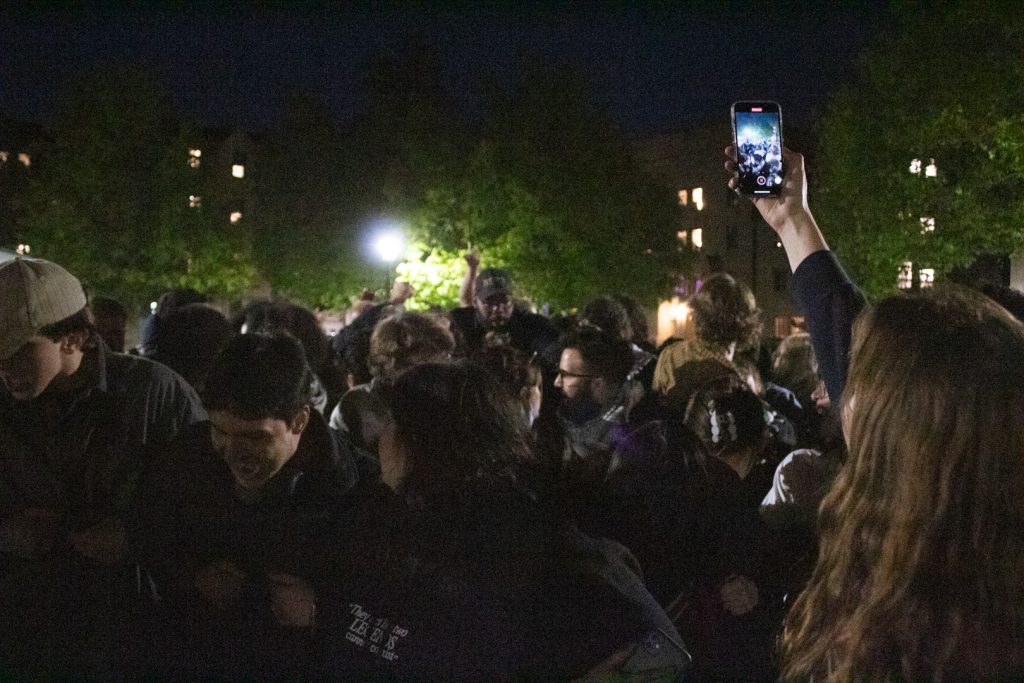
Though tense and somewhat jarring, these two police encounters pale in comparison to the response of an encampment erected in Indiana University, some two hundred miles south from where we stood. It was there that students were beaten and dragged across the ground, culminating with the state police arresting 33 students. And these arrests were but a ripple in the water of hundreds of such police confrontations that have taken place at Columbia, Yale, NYU, Ohio State, Emory, and countless others.
But despite these instances of aggressive police repression on university students peacefully protesting, we must not let these events overshadow the true horrors in Palestine that we are fighting against. Mass graves in hospitals, starving crowds mowed down by IDF soldiers, bodies crushed by military vehicles, dismembered arms and legs littered about the rubble of buildings bombed by AI programs, children forced to eat grass and animal feed to stay alive, sewage treatment plants destroyed, agricultural fields bulldozed, universities blown up, refugee camps and mosques targeted, hospitals raided, civilians executed in the streets, entire cities razed to the ground, and a nice juicy package of $26 billion from the United States, freshly signed and sent by Mister-No-Malarkey himself, to fund this accrual of atrocities.
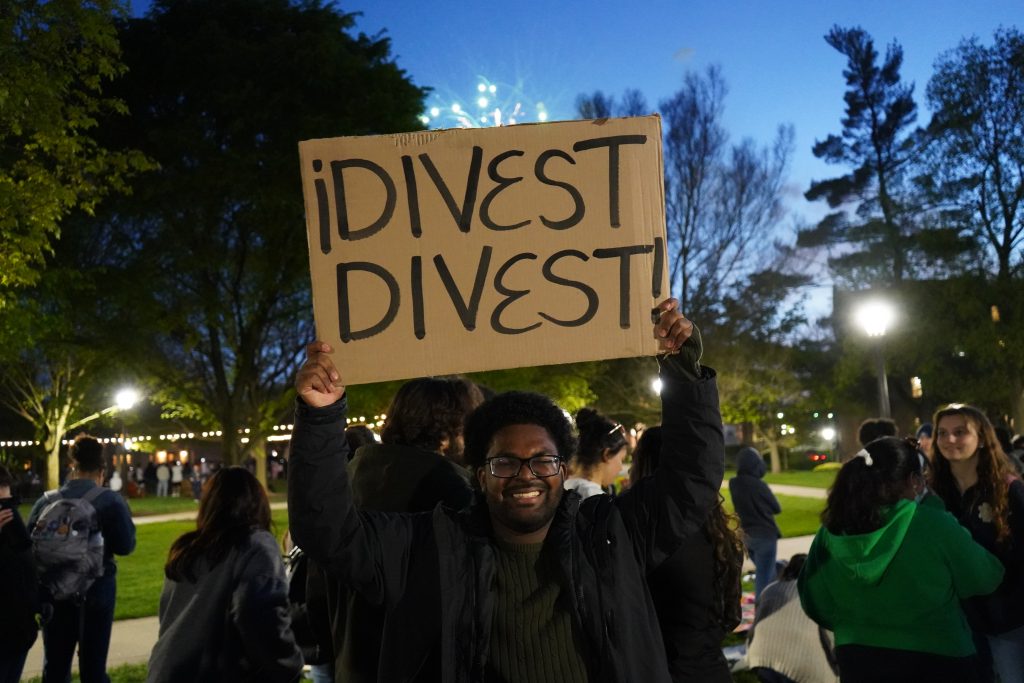
These are the images that have been seared into our minds over the last six months, which have inexorably compelled us to put our education and careers on the line. To uncritically read what is propagated by the mainstream media or our elected officials on this wave of student protests, one might conclude that our protests come from some other impulse: a deep-rooted and pervasive antisemitism. Professor Atalia Omer, a Jewish Israeli scholar who was with us at the protest, powerfully counters this narrative: “How come justice, democracy, and equality are interpreted as ‘antisemitic’? This points to a discursive problem that needs to be unentangled. The problem is that for years now, there has been an intentional equation and conflation between Israel and Jews. This conflation renders Jews critical of Israeli policies as somehow un-Jewish. While it is essential for activists, including on university campuses, to educate themselves on what is and what is not antisemitism, the conflation of Jews with Israel is itself deeply dangerous for American Jews.” To conflate the criticism of our nation’s support of a government that the International Court of Justice has deemed is committing a “plausible genocide” with a kind of deep-seated hatred against a particular ethnic and religious identity is not only intentionally dishonest, it is weaponizing this Jewish identity, using it as a shield to deflect any blame and any scrutiny of Israel’s policies. Our movement rejects all forms of ethnic and religious hatred, including antisemitism, Islamophobia, anti-Arabism, and racism. We recognize that the institutions upholding these social and structural ills are the same forces that are dehumanizing, vilifying, and violently oppressing Palestinians and other peoples around the world––we must understand that these struggles are inextricably intertwined.
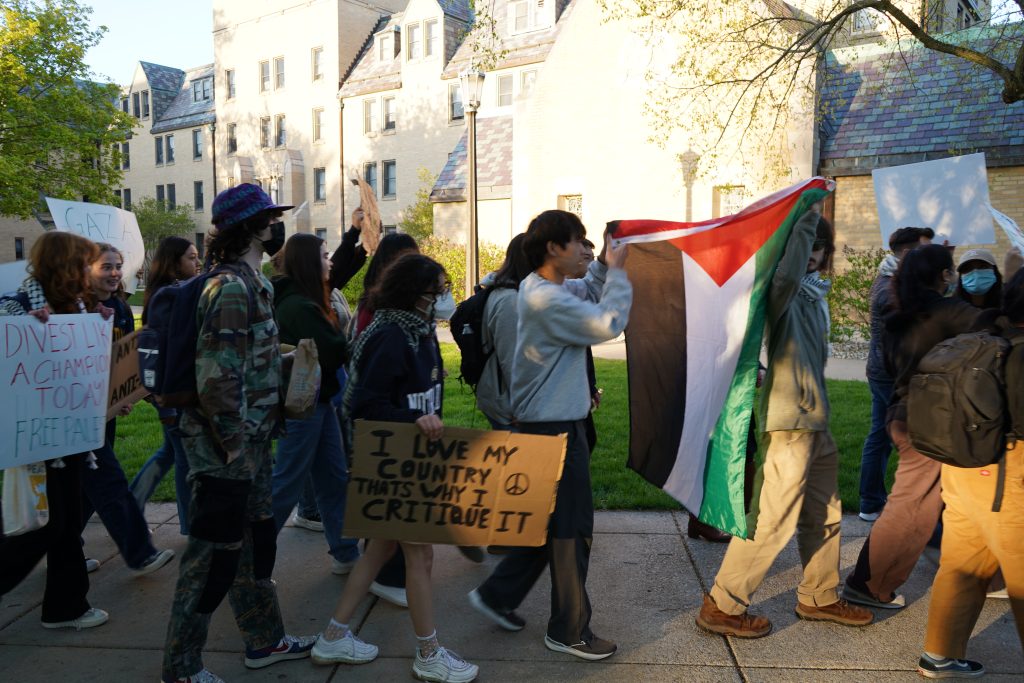
Towards the end of the night, grad students Joryán Hernández and Spencer French read aloud a poem by Guatemalan poet and revolutionary Otto René Castillo, first in its original Spanish, then in its English translation. The poem interrogates our positionality as students within this academic institution, confronting us with the question firmly imprinted on Fr. Jenkins’ celebration mugs: in what ways are we really a ‘force for good’ in the world? As we sit in our classes on French literature, on business management, on the continental philosophy, how will this be perceived by the poor, the oppressed, the exploited, the dehumanized? Below is a short excerpt from the poem:
Intelectuales apolíticos
de mi dulce país,
no podréis responder nada.
Os devorará un buitre de silencio
las entrañas.
Os roerá el alma
vuestra propia miseria.
Y callaréis,
avergonzados de vosotros.
Apolitical intellectuals
of my sweet country,
you will not be able to answer.
A vulture of silence
will eat your gut.
Your own misery
will pick at your soul.
And you will be mute
in your shame.
Now we ask ourselves what comes next. The 15-minute rule, threatening suspension or expulsion if disruptive demonstrators do not disperse after the given time, holds no more power over us. From 5pm to late, we organized, protested, and bonded with one another. In moving toward our goal of ending oppression around the world, we can celebrate what we’ve already accomplished—channeling the radical tradition of activism on Notre Dame’s campus that is not often discussed—as well as recognize what more we can and should do. We should be proud. This is not our final demonstration for liberation, but one of many to come.

Photos in article by Alice Lei and Lea Randolph

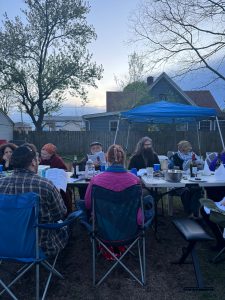

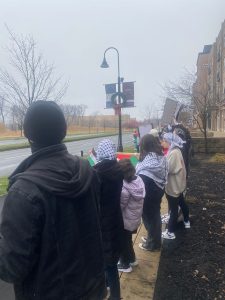
Good – I should certainly pronounce, impressed with your web site. I had no trouble navigating through all the tabs as well as related info ended up being truly easy to do to access. I recently found what I hoped for before you know it in the least. Quite unusual. Is likely to appreciate it for those who add forums or anything, site theme . a tones way for your customer to communicate. Nice task..